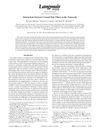 1 citations,
January 2020 in “International journal of research in pharmacy and chemistry”
1 citations,
January 2020 in “International journal of research in pharmacy and chemistry” Eclipta alba has many health benefits and potential for medical and nutritional use.
Labrasol® in phospholipid vesicles improves minoxidil delivery to the skin, potentially aiding hair growth treatments.
 January 2021 in “Social Science Research Network”
January 2021 in “Social Science Research Network” The new treatment using tiny lipid carriers to deliver minoxidil and latanoprost directly to hair follicles shows promise for alopecia.
February 2023 in “Journal of Microencapsulation” The finasteride nanosystem with trehalose is stable and effective for topical hair loss treatment.
 4 citations,
April 2018 in “Biotechnology Letters”
4 citations,
April 2018 in “Biotechnology Letters” Human growth factor 20 can boost mouse whisker growth.
Optimized carriers effectively deliver Finasteride for hair loss treatment.
23 citations,
May 2017 in “Journal of the American Academy of Dermatology” FFA patients have fewer melanocytes and thinner skin compared to others.
 28 citations,
December 2010 in “Langmuir”
28 citations,
December 2010 in “Langmuir” Hair fibers interact through classical forces, which are influenced by treatments and products, important for hair care and other applications.
1 citations,
January 2022 in “Brazilian Journal of Pharmaceutical Sciences” Minoxidil can be effectively encapsulated in coated nanovesicles for potential drug delivery.
 February 2024 in “Current Medicinal Chemistry”
February 2024 in “Current Medicinal Chemistry” Minoxidil nanocrystals improved hair growth in mice more effectively and safely than regular Minoxidil.





